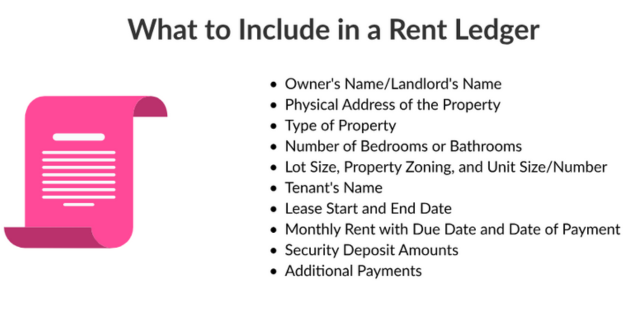In the modern world, renting is an essential part of life. Hence, the knowledge of the rent ledgers is irreplaceable for both tenants and landlords. For a person living in a rented accommodation, the rent register gives them a right to know in advance how much they must pay, to make a correct reconciliation of payments, to check for errors, and so on.
In the meantime, landlords gain practical knowledge of how to maintain personal and business records, keep the business legal, and successfully deal with tenants.
This blog will discuss the different perspectives on rent ledgers, highlighting their utility and importance.
From basic knowledge about its components to practical ways of avoiding the pitfalls of renting, the blog is the source of all knowledge for those trying to enter the housing market.
What Is A Rental Ledger?
The rent ledger is a document with a comprehensive account of every financial deal between a tenant and landlord clearly and professionally. The rent payment records generally include data like the status of paying their rent, times when the tenant failed to pay rent, amounts still owed, and other additional charges such as late fees and compensations.
The principle of the financial record of the parties related to the leasing transactions and the rental book helps keep the transparency and responsibility between the landlord and the tenant, which you see is of great importance for both parties as it tracks the financial facts of the leasing agreement.
What Is A Landlord Lease Ledger?
The landlord lease ledger is a detailed report on all the inward and outward flows of funds that the landlords maintain throughout their possession of the rental property. This register covers the critical items of the contract, i.e., the rent payments, security deposits, additional extra bills, and deductions as a whole.
The landlord-tenant relationship challenges the landlord to maintain his income statements as straightforwardly as possible. Hence, transparency and accountability are considered essential attributes of this contract. The landlord’s monthly rental register helps track payments in arrears, pinpointing lease payments or anything unusual happening on the property. It also means that it should have an exemplary structure of financial records for that particular property.
What Is A Tenant Ledger?
The agreement on rental property commonly comprises all the financial or monetary transactions between the landlord and the tenant until the end of the Rental Contract. This brings about the development of the ledger, which has made it possible for the landlord to control critical details like the rent due dates and any outstanding charges. The good thing is that the extra charges, such as the penitential charges for late payments, have also been incorporated into the ledger.
The booklet is a matter of fundamental importance for all tenants as it helps to keep up their rent task list, and when proof of rent payments is required, or the landlord and the tenant are in dispute regarding a rent issue, the handy guide is at hand.
What Information Is Included In Rental Ledger?

The following information is included in the rental ledgers as an essential and inseparable part.
- Name of the tenant and name of the landlord
- Address of the property and classification of property
- The square footage of the unit, lot size and zoning rule
- Payment details and payment method
- Oustanding balance or security deposit
- The commencement date and the ending date
- The monthly rent
- Any other helpful information.
What Is The Importance of Rental Ledger?
The rental ledger holds significant importance for tenants and landlords for several reasons. Some of them include:
1. Payment Transparency
It functions like electronic paperwork whereby all transactions are recorded, so the tenant and the landlord shall remember if any rent payment obligations are there. It helps eliminate any misunderstandings related to money.
2. Dispute Resolution
Through this verification process of all the payments made and the transactions done, the rent ledger works as the document to be relied on that may give out the correct solutions for unclear organisers and serve as the history/chronological report that may give out the solution to the disputes.
3. Financial Accountability
This mechanism imposes a rule of only delayed payments and encourages tenants to give timely rent to landlords.
4. Record Keeping
The rent ledger maintains quality in data arrangement and provides easy access to financial data whenever needed.
5. Security Deposit Documentation
The rent ledger acts as proof of the security deposited by the tenant. It allows the tenant to ask for their financial right whenever they leave.
Usually, the Tenancy Agreement leads to a sense of trust, clarity and accountability for both landlords and tenants. Consequently, the rental management sector is more seamless and straightforward.
Explore More In The Field of

With Citadel Property Management Corp.
Rental property management is a vast field in itself. It works as a catalyst to provide all the necessary details and requirements to the tenants and landlords. Rent Ledgers, their components, significance, why it is essential, and which parties are involved are small segments or parts of rental property management.
Rental property management is a field whose knowledge is a must in this modern world. You can reach us at Citadel Property Management Corp. to learn more about Rental Property management’s various segments and scope. At Citadel, we provide you with the best knowledge and experience related to property management. Additionally, we also assist in services including Single unit management, Real Estate Brokerage, New Development Marketing, Construction Management, and more.



